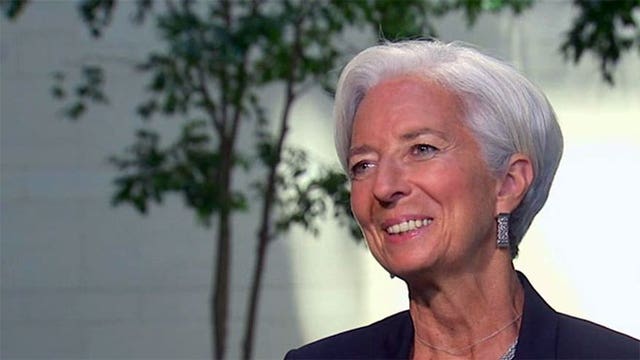IMF's Lagarde: Iraq Oil Shock May Threaten U.S. Economy
The ongoing turmoil in Iraq has the potential to throw a wrench into the U.S. economy, International Monetary Fund managing director Christine Lagarde said in an interview on FOX Business.
Escalating battles between Iraqi forces and an Al Qaeda-inspired terrorist group, which has taken control of several key cities, have fueled concerns over an oil shock. Brent crude oil, the international benchmark, climbed 4.2% last week.
On Monday, Brent crude was up 47 cents at $112.93 a barrel, while West Texas Intermediate crude jumped another eight cents to $106.99 a barrel.
“When we look at big geopolitical risks of that nature, we have to look at the spill of the consequences on the U.S. economy,” Lagarde told FBN’s Liz Claman. “We believe the oil shock that could result from the current tension in Iraq in particular might affect the economy.”
For that to happen, the shock “would have to be rather deep and rather long lasting,” Lagarde added.
The interview followed the release of the IMF’s annual report on the U.S. economy. The organization slashed its forecast for 2014 economic growth to 2% from 2.8% in response to a weak first quarter. Its growth projection for 2015 remained at 3%.
“What happened is [the first quarter] was dreadful,” Lagarde commented. “Our forecast is revised downwards, but our expectations are quite high and positive for the coming months.”
In its report, the IMF said the U.S. should consider raising the minimum wage, which is currently 38% of the median salary.
“I know it’s controversial. But we also look at numbers, and we see that the United States is within the last three countries (among Organization for Economic Co-operation and Development members) with a minimum wage that is less than 40% of the median wage,” Lagarde explained.
When asked about concerns among small and large businesses, Lagarde acknowledged there might be a loss of jobs “in the short term.”
“When you look at the significant increase of income that poorly paid people will have, we believe that in the long run it will be net positive for the economy and for employment as well,” she added.
The IMF is also recommending a gradual elimination of itemized deductions and other tax reforms, with Lagarde saying the tax code is too complex.
Based on its latest report, the IMF believes the U.S. economy will not return to full employment until the end of 2017, while inflation estimates remain low. As a result, the Federal Reserve could keep its policy rates near zero “for longer than the mid-2015 date currently foreseen by markets,” according to the IMF.




















